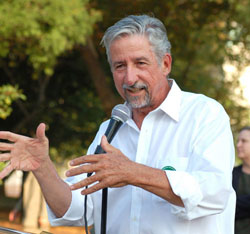 On Oct. 23, Tom Hayden, a leader on the U.S. left who dedicated his life to social justice, died. His work began in the student anti-war and civil rights movements in the sixties to span nearly two decades in the California legislature, and included issues as diverse as organizing to improve U.S. relations with Cuba, ending the war on drugs and protecting the Los Angeles valleys he called home. He was a prolific writer, with his latest book, Hell No! The Forgotten Power of the Viet Nam Peace Movement due out in March 2017.
On Oct. 23, Tom Hayden, a leader on the U.S. left who dedicated his life to social justice, died. His work began in the student anti-war and civil rights movements in the sixties to span nearly two decades in the California legislature, and included issues as diverse as organizing to improve U.S. relations with Cuba, ending the war on drugs and protecting the Los Angeles valleys he called home. He was a prolific writer, with his latest book, Hell No! The Forgotten Power of the Viet Nam Peace Movement due out in March 2017.
A few months before his death, I visited him in his Santa Monica home to talk and to interview him regarding the 2016 elections and the rise of Trump, which I found baffling and disturbing. This is that June interview.
LC: You know, for a long time people including myself thought it could never be possible that Donald Trump could become president of the United States. Do you think it is a serious threat now?
TH: Yes, I think it’s a serious threat.
Do you think he has a possibility then of winning?
It’s very, very difficult for him to win because the normal base of the Republicans and conservatives hits its maximum at about 48%. And that sounds scary–it’s like saying 48% of American voters are for Hitler. But it could drop a little below that because he’s so extreme.
So when the Republican candidate loses to the Democrats, the vote difference is always between 1 and 4%. Obama was considered a landslide because he won by more than 5% [in 2008]. So that’s Trump’s problem. He’s stuck with the Republican base, which includes a lot of people who don’t actually like him, personally or ideologically.
All things considered, it will be a vicious, incendiary campaign with the potential of violence, but he should lose. You don’t want to be comfortable with what I’m saying though–I’m not assuring you of anything.
How do you explain support for this multimillionaire who is very open about being of the privileged class among this poor, white base in large part of the Republican Party?
I don’t know how much it’s a poor, white base. It’s a Republican base.
My explanation would be that first of all, the media power of an everyday celebrity who has done this for close to 30 years in our living rooms makes him a very familiar figure, and even his viciousness in firing people is not taken seriously by the audience. It’s like with American Idol, our favorite contestant loses, and in Trump’s world he gets to point his finger at somebody and say ‘you’re out’. He takes satisfaction in that; he thinks that’s the American way of firing. So that’s the first thing: everyone kind of knows him and knows that he’s an act and not real, so it’s hard to distinguish between real and apparent.
The second thing is economic nationalism, which is a perennial issue because corporate America and liberal democratic America have not been able to raise the incomes of the working class or the poor over a 40-year period. They get away with making up funny numbers–you know “underemployed” becomes the same as part-time employment which becomes different from unemployment–but the real unemployment rate and the real standard of living is low.
Many people are really living precariously. And it’s the greed and ideology of the Republicans and the corporate Democrats that has conspired to put people in this situation while every election promising that they’re going to do something for the middle class. And they are unable to do anything, because when they do it is a sham solution that appears on television, like the earned income tax credit. So the failure to seriously deal with the problem caused by the 1% is the second thing.
Why do they believe that Trump –clearly as a representative of the 1%– would actually solve the problem or even deal with it?
Because rightwing populism is a long tradition in America and the rich have always profited off it and the rightwing has always profited off it.
And that’s because of the third factor: the divided rule against Blacks and Latinos. You have a scapegoat that Trump is eager to provide, like talking about Mexicans in this vernacular, racist slang. It’s true, it’s odd to hear it coming out of his mouth, but he means it.
When he says that the Mexican immigrants are a bunch of violent thugs and rapists, what does he mean? He means that some percentage of them are bad people– it could be 1%, it could be 5%– but it’s always publicized and magnified in the media. You remember where it all started, here, when Pete Wilson was running for governor in California. His television ad was a film of Mexicans running over the border, and the television ad said “They’re coming, they’re coming!” Californian voted for that, and later it was overturned by the courts. That law would have limited immigrants from having access to services and that led to the revival of the Chicano movement and Mexican movement and immigrant rights movement to where it is today–kind of with its largest force all over the hemisphere, but at least since the 1930s.
I think the third factor is the resentment of the sixties. The resentment of civil rights, the resentment of feminism, the resentment of Muslims, the resentment of Mexicans at the border—this is the basic racial and sexual agenda of the Trump base. These are the people who are violent, who urge on violence and will commit violence, at any moment, unprovoked.
So you think it’s those three things: his celebrity status, economic nationalisn and a kind of a backlash to repeal the sixties that has been accumulating for 40 years?
Yeah. ‘Stop the immigrants, we can’t take it anymore, and reverse the economy that’s completely rigged and the political system that is completely rigged’– there you have a Trump voter potentially.
Trump has shown a real disdain for women in this campaign and his attacks on Hillary Clinton are frankly misogynist, yet women are voting for him. Is this also a part of the backlash, going back to the sixties–a very strong, macho stance–an open assertion of male dominance?
…The desire to demonize and scapegoat women is emotional, it’s visceral. It’s an issue that stirs up a certain percentage of men. Nevertheless, if you assume that people vote their interests and you actually look at polling that’s serious and ignore the media exploitation, Trump is doing badly among women. And he’s not scoring on the economic numbers. He’s scoring on economic rhetoric and male rhetoric and race rhetoric.
It seems the media has been his ally and played a big role in fomenting divisions in this campaign.
Yeah, but that’s Trump. I don’t think you need to say anything more. The media could tone it down, I don’t know by what right he’s allowed to have a press conference in his office that lasts 45 minutes… I mean, you see more of Trump in his office than you see of Trump on the campaign trail. And it’s never compared to Bernie or Hillary or the others.
That is the complete failure of the media to be able to rise against its own profit motive—selling television ads, selling television time. They claim, of course, that Trump sells. Just like they always say blood sells. But certain things can’t have a price attached to them. The media also has competing standards; by their standards, he doesn’t even deserve to be a credible candidate, so they are retreating from their own standards out of this lust for the spectacle.
Let’s turn to foreign policy. In Mexico, there’s a lot of concern about what a Trump presidency would mean and what it means that so many people are supporting him with the type of attitudes he’s espoused toward Mexicans and toward Mexico itself as a country and a neighbor. What would a Trump foreign policy look like for Mexico and the rest of Latin America?
Well, let’s not forget that he’s attacked immigrants from Muslim countries; he’s attacked the Catholic pope. He’s in alignment with the rightwing movement in Europe and parts of Latin America and Central America, so he’s not an isolated reminder of the 1930s and deportations. He’s of the same rightwing platform.
And it always becomes worse for two reasons: if the economy is in recession and secondly, in the mind of somebody who has a prejudice again Mexicans or Latinos– whether it’s conscious or unconscious is a good question, but say a mixture–when Mexicans or Mexican Americans are gaining ground by any measure – candidates for high office, voter turnout, dominating school districts, large blocks of congressional members or of the state legislature– what would appear to be moving forward to a Mexican set of eyes would appear to a racist like a fall, like you’re falling down an elevator. Ever notice when you’re on an elevator, and you’re not sure whether you’re going up or down because it always looks like down when the people across from you are going up?
So this is perceived as a loss for the white race, the Anglos, and the men. And it can be backed up with evidence, especially economic evidence, that many Blacks and Latinos have made gains by their standards and white men have not.
So that’s what the Trump voters see. They don’t see hungry, desperate Mexicans at the border, like the Stature of Liberty, asking to be protected. They see people who are physically coming to the border from far away, south of the border or somewhere beyond the vision of the white men, the Anglo, so it appears like they’re in your face. That’s a psychological dimension that’s confusing to some.
Do you think Trump would be a much more hawkish president, more eager to go to war as president?
First of all, to answer your question: he would try to carry out his deportations order. You know as well as I do, Laura, that there are legal limitations on what he could do unilaterally, but he would try to do it and he would blame Mexico if he couldn’t do it or he would blame some other groups if he couldn’t do it. His pattern is to try to bully you until you acquiesce or retreat. So if that doesn’t lead to a civil war, it’s civil strife at the border for sure, and you know the Mexican Americans will jump in. And the border patrol is a racially biased by tradition; it’s a very conservative force. They’re like Joe Arpaio. Except for Clinton and the White House and the courts which put occasional restraints on them, they’re like a mercenary army that would be thrown into this strife.
So let’s just assume he doesn’t make it. Then we’re back to the status quo. I think with either Hillary or Trump as a simple choice, Hillary would get 75% of the Latino vote, hopefully 80%, on this issue alone. And she will reinstate the Dreamers and she will start progress towards the previous status quo, which was to achieve a path to citizenship.
The reason I think I’m optimistic on this, if we get to this point, is that the Republican Party has sold itself to this hysterical, anti-Mexican policy that is way, way more militarized and way more to the right than even the Republican Party has been. Not so long ago some Republicans like Ronald Reagan were of a different mind; they were actually giving people amnesty. So what might happen–and I think it will– is that even if Hillary wins and Trump loses, the Republicans will be paying this terrible price to their own electoral power and stability because they will have no platform except Trump and voters will vote against them for at least another ten years if not 20 or 30. Meanwhile, the Latino vote is getting larger–in California, in Illinois, in Florida and so on. There are states that are approaching 40%. And there are hundreds of cities that have Mexican majorities or Latino and African-American majorities, in districts where a mayor can be elected or a school board member can be elected. So it’s unstoppable, but that has not stopped people from trying to stop the unstoppable. It’s going to get physical.
Tom Hayden’s voice–his thinking, writing and action on so many key issues of our times—will be greatly missed. He refers here to the rise of Trump as a backlash against advances we have made in feminism and women’s rights, civil rights and immigrant rights. Beyond voting against this backlash, criticizing Trump and attempting to understand why he garnered so much support in a society that has formally opposed many of the sexist and racist arguments he purports, all of which we must do, the campaign has shown us that now more than ever we must act to defend those historic gains, gains that Tom Hayden was a very active part of.



